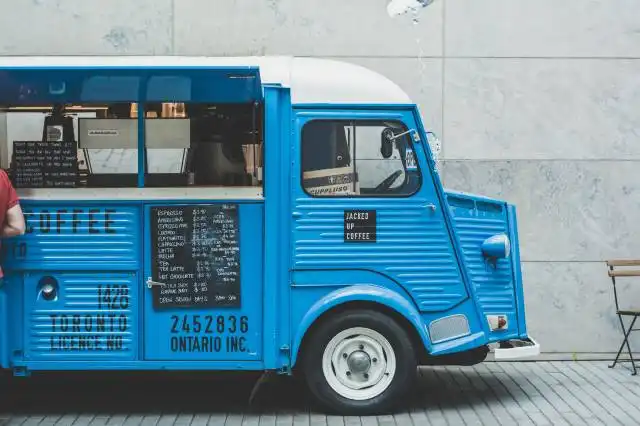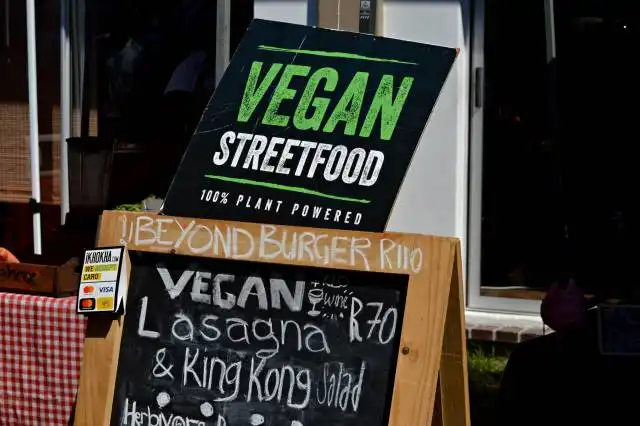Start a Food Truck Business
Serving Culinary Delights on Wheels: Your Next Entrepreneurial Success
| Updated


FOOD TRUCK BUSINESS
Slap on your apron and crank up the sizzle, because a Food Truck Business could be your ticket to entrepreneurial success! Like a restaurant on wheels, this venture allows you to serve up culinary delights directly to customers in various locations. It is the perfect venture for those with a passion for food and a hunger for freedom, combining the best elements of the restaurant industry with the mobile convenience of a traveling eatery. Tailoring your menu to local events or popular spots could see your business transforming from a small food wagon to the next big thing in street gastronomy.
Jump to Business Plan
RELATED BUSINESS IDEAS
Browse ALL Rental & Delivery Services Business Ideas
Discover Your Perfect Domain
Unlock the door to your online success with our hand-picked selection of premium domain names. Whether you're starting a new venture or rebranding an existing one, the right domain can set the tone for your digital presence. Browse through our curated list, each with its unique potential to enhance your brand's visibility and credibility.
FOOD TRUCK MINI BUSINESS PLAN
This a quick reality check to help you identify the strengths and weaknesses of your business concept before you dive in.
Expected Percent Margin:
- Gross Margin: 60-70%
- Net Profit Margin: 10-20%
Earnings Expectations:
- Daily Earnings: $100 - $1000
- Weekly Earnings: $700 - $7000
- Monthly Earnings: $3000 - $30000
- Annual Earnings: $36000 - $360000
Actions to Hit Those Numbers:
Equipment and Inventory Management:
- Initial Investment: Approximately $50,000-$100,000 on truck and kitchen equipment.
- Ingredients: Establish relationships with local markets to ensure fresh and cost-friendly ingredients.
Marketing and Customer Acquisition:
- Social Media: Regularly update your location, menu, and special offers on platforms such as Twitter and Facebook.
- Word of Mouth: Provide a memorable and unique food experience to motivate customers to recommend your truck to others.
Sales and Customer Experience:
- Menu Pricing: Keep an average meal price between $6 - $12.
- Off-Peak Specials: Implement special deals during non-peak hours to increase customer volume.
Cost Control:
- Fuel: Factor in fuel costs for both transportation and cooking appliances.
- Permits and Licenses: Include budget for recurring city and food permits.
Business Operations:
- Operating Hours: Depending on location and footfall, operate approximately 10 hours a day.
- Transaction Volume: Aim for around 50-100 transactions per day.
Like all businesses, running a food truck requires hard work, patience, and a dash of creativity. Keep in mind these are generalized estimations and can vary depending on location, food type, and unique business circumstances. Always consult with a financial advisor for personalized advice.
NOT WHAT YOU HAD IN MIND? Here are more ideas



Browse ALL Rental & Delivery Services Business Ideas
Grab Your Business Website Name
Before you get caught up in the whirlwind of setting up your business, invest in a domain name. It's a small but significant step that lays the foundation for your brand and makes it easier for customers to find and trust you. Just like you wouldn't build a house without securing the land first, don't build a business without securing your domain name.
"Why? Can't that wait?" Here's why it shouldn't
Step 1: Determine if Food Truck Business is Right Endeavor
Breakdown of startup expenses
Before starting a food truck business, it is important to understand the startup costs. This includes the cost of the truck, the cost of any necessary equipment, the cost of any necessary permits, and the cost of any necessary insurance. Additionally, it is important to factor in the cost of any necessary renovations and the cost of any necessary supplies. It is also important to factor in the cost of any necessary marketing materials, such as business cards, flyers, and signage. Finally, it is important to factor in the cost of any necessary licenses and the cost of any necessary training.
Breakdown of ongoing expenses
After starting a food truck business, it is important to understand the ongoing costs. This includes the cost of any necessary repairs and maintenance, the cost of any necessary supplies, and the cost of any necessary marketing materials. Additionally, it is important to factor in the cost of any necessary licenses and the cost of any necessary insurance. It is also important to factor in the cost of any necessary permits and the cost of any necessary staff. Finally, it is important to factor in the cost of any necessary taxes and the cost of any necessary rent.
Examples of ways to make money
There are many ways to make money with a food truck business. One way is to sell food directly to customers. This could include selling pre-made meals, snacks, and drinks. Another way is to partner with local businesses and cater events. This could include weddings, corporate events, and festivals. Additionally, it is possible to partner with local restaurants and offer delivery services. Finally, it is possible to offer meal prep services and meal kits to customers.
Step 2: Name the Business
- Brainstorm ideas: Start by brainstorming a list of potential names that reflect the type of food you plan to serve, the location of your business, or the theme of your truck. Consider using a play on words, puns, or alliteration to make your name stand out.
- Research the market: Research the local market to make sure the name you choose isn’t already taken. You don’t want to choose a name that’s too similar to an existing business as it could create confusion among customers.
- Check availability: Once you’ve narrowed down your list of potential names, check to make sure the domain name and social media handles are available. You want to make sure customers can easily find your business online.
- Consider legal implications: Before you settle on a name, make sure to check with your local government to make sure it’s not already in use. You may need to register your business name with the local government or trademark it to make sure it’s legally protected.
- Get feedback: Ask friends, family, and potential customers for their opinion on the names you’re considering. This will help you determine which name is the most memorable and appealing to customers.
Step 3: Obtain Necessary Licenses and Permits
In order to start a food truck business, there are a variety of licenses and permits that are required. Depending on the state, city, and county, the list of licenses and permits can vary. Generally, a food truck business will need to obtain a business license, a food service license, a food handler's license, a health permit, a fire permit, and a zoning permit. Additionally, the food truck business will need to obtain a commercial vehicle registration and a certificate of inspection. All of these licenses and permits will need to be obtained before the food truck business can start operating.
Cost of licenses and permits
The cost of licenses and permits will vary depending on the state, city, and county. Generally, the cost of the business license, food service license, and food handler's license will range from $50 to $500. The cost of the health permit, fire permit, and zoning permit will range from $50 to $1000. The cost of the commercial vehicle registration and certificate of inspection will range from $50 to $200. All of these licenses and permits will need to be obtained before the food truck business can start operating.
Where to obtain licenses and permits
The licenses and permits can be obtained from the local government office. Generally, the business license, food service license, and food handler's license can be obtained from the state government office. The health permit, fire permit, and zoning permit can be obtained from the local county office. The commercial vehicle registration and certificate of inspection can be obtained from the local DMV office. All of these licenses and permits will need to be obtained before the food truck business can start operating.
Step 4: Find a Location
Research the local area When looking for the right location for a food truck business, it is important to research the local area. Consider the demographics of the area, the local competition, and the foot traffic. It is also important to look into the local regulations and restrictions. Make sure to check for zoning laws, parking regulations, and any other restrictions that may affect the business.
Consider the visibility of the location When selecting a location, it is important to consider the visibility of the spot. Look for a location that is easily seen by potential customers. Think about the types of people who will be passing by the area and how they will be able to spot the food truck. Consider the lighting, the signage, and any other factors that may help the food truck stand out.
Think about the convenience of the location When selecting a location, it is important to think about the convenience of the spot. Consider the distance from the food truck to the customer. Think about the ease of access for customers and the ability to park the truck in a convenient spot. Also, consider the ease of access for the food truck operators.
Consider the cost of the location When selecting a location, it is important to consider the cost of the spot. Look into the cost of renting or leasing the space, as well as any additional costs associated with the location. Make sure to factor in the cost of utilities, insurance, and any other costs that may be associated with the location.
Step 5: Purchase a Truck
- Research different types of trucks When looking for the right truck for your food truck business, it is important to research the different types of trucks available. Consider the size of the truck, the features, the cost, and the fuel efficiency. Also consider if you will need a refrigeration unit, a generator, and other features that will be necessary for your business.
- Compare prices Once you have narrowed down the type of truck you need, it is important to compare prices from different dealers. Look for the best deal and make sure to read the fine print before signing any contracts.
- Consider financing If you are unable to purchase the truck outright, you may need to consider financing. Research different financing options and compare interest rates, terms, and conditions. Make sure to read the fine print and understand all of the details before signing any contracts.
- Get a vehicle inspection Before purchasing the truck, it is important to get a vehicle inspection to make sure the truck is in good condition. This will help to ensure that you are not purchasing a truck with any hidden issues that may cost you more money in the long run.
- Purchase the truck Once you have found the right truck and have secured financing, you are ready to purchase the truck. Make sure to read all of the paperwork carefully and understand all of the terms and conditions before signing.
Step 6: Design the Truck
- When designing the truck, it is important to consider the size of the truck, the layout of the kitchen, and the type of equipment that will be used.
- It is also important to consider the type of cuisine that will be served, as this will determine the type of equipment and layout that is needed.
- Additionally, it is important to consider the type of materials that will be used to construct the truck, as this will determine the cost and durability of the truck.
- It is also important to consider the type of graphics and branding that will be used on the truck, as this will help to create a unique identity for the business.
- Finally, it is important to consider the cost of the truck, as this will determine the overall budget for the business.
Sources for designing the truck
- There are many sources available for designing the truck, including online resources, professional designers, and local businesses.
- Online resources can provide a variety of ideas and designs for the truck, as well as tips and advice on how to construct the truck.
- Professional designers can provide a more customized design for the truck, as well as advice on the best materials and equipment to use.
- Local businesses can provide a variety of materials and equipment for the truck, as well as advice on the best layout and design for the truck.
- Additionally, local businesses can provide advice on the best graphics and branding for the truck, as well as tips on how to create a unique identity for the business.
Step 7: Stock the Truck
Stocking the truck is an important step in starting a food truck business. It is important to make sure the truck is stocked with all the necessary items to make the food you plan to serve. This includes items such as food, utensils, napkins, condiments, and other items that may be needed to serve customers. Additionally, it is important to make sure the truck is stocked with items that will help keep the food fresh and safe, such as coolers and refrigerators. It is also important to make sure the truck is stocked with items that will help make the food look appealing, such as plates, cups, and other serving items.
Tips on ordering supplies
When ordering supplies for the truck, it is important to research the best prices and find the best deals. Additionally, it is important to make sure the items are of good quality and will last a long time. It is also important to make sure the items are easy to store and easy to access. Additionally, it is important to make sure the items are easy to clean and maintain. Finally, it is important to make sure the items are safe to use and will not cause any harm to customers.
Step 8: Market the Business
Introduction The eighth step in starting a food truck business is to market the business. It is important to have a plan in place to help spread the word about the business and to reach the target audience. This step will help to ensure that the business is successful and that customers are aware of the food truck's offerings.
Utilize Social Media One of the best ways to market a food truck business is to utilize social media. Creating accounts on platforms such as Facebook, Instagram, and Twitter can help to spread the word about the business and to reach potential customers. Posting regularly about the food truck's offerings and specials can help to keep customers engaged and informed.
Networking Networking is another great way to market the business. Attending events and conferences in the local area can help to spread the word about the food truck and to make connections with potential customers. Additionally, it is important to reach out to local businesses and organizations to build relationships and to create partnerships.
Word of Mouth Word of mouth is one of the most powerful forms of marketing. Encouraging customers to spread the word about the food truck can be a great way to reach potential customers. Offering incentives such as discounts or free items can help to encourage customers to share their experiences with others.
Advertising Advertising is another great way to market the business. Placing ads in local newspapers and magazines, as well as on radio and television, can help to reach potential customers. Additionally, creating flyers and distributing them in the local area can help to spread the word about the food truck.
Conclusion Marketing the business is an important step in starting a food truck business. Utilizing social media, networking, word of mouth, and advertising can help to spread the word about the business and to reach potential customers. With a good marketing plan in place, the food truck business can be successful.
Step 9: Launch the Business
- Start with a soft launch: A soft launch is a great way to test the waters and get feedback from customers before officially launching the business. This can be done by setting up a pop-up shop or running a limited menu for a few days.
- Promote the business: Once the business is ready to launch, it’s important to promote it. This can be done through social media, local events, and word of mouth. Additionally, consider partnering with other local businesses to help spread the word.
- Set up a website: A website is a great way to advertise the food truck business and provide customers with information about the menu, hours, and location. Additionally, it can be used to collect customer feedback and build an online presence.
- Get the necessary permits: Before launching the business, it’s important to make sure all of the necessary permits and licenses are obtained. This includes permits for the food truck, food handling, and any other permits required by the local government.
- Have a grand opening: A grand opening is a great way to draw attention to the business and get customers excited about the food truck. Consider offering discounts or special menu items to help draw in customers.
EXPLORE MORE CATEGORIES
Browse ALL Business Idea Categories
TAKE THE NEXT STEPS










